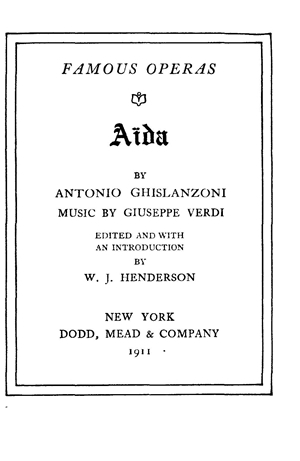
Aida by Antonio Ghislanzoni, music by Giuseppe Verdi
- Antonio Ghislanzoni (author)
- Giuseppe Verdi (author)
- William James Henderson (introduction)
A side-by-side Italian and English edition of the libretto. Famously first performed in Egypt in 1871, Aida, an Ethiopian princess, has been enslaved in Egypt. Her father has invaded Egypt in order to free her but he is defeated. A love triangle develops between Aida, a young warrior Rhadames, and Amneris, the Egyptian king’s daughter. Aida and the persecuted Rhadames choose death together rather than be separated.